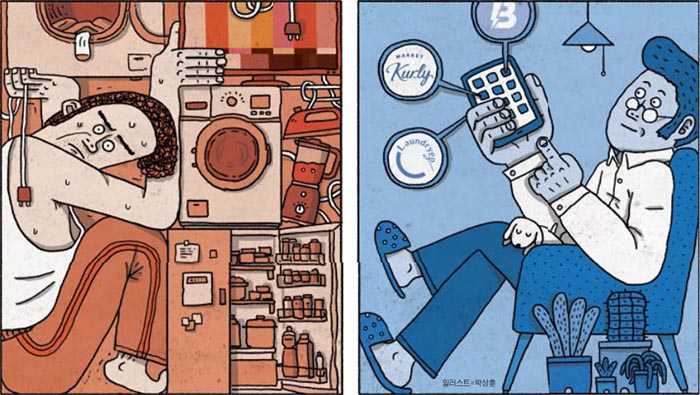App Services Push out Home Appliances
25 January, 2020

Common household appliances like washing machines, TVs and even refrigerators are losing their appeal due to the smartphone apps that offer innovative and convenient services.
Apps take care of laundry, food shopping and other domestic chores and are becoming increasingly popular among not only singles but also double-income households. Industry watchers say the graying population will spur demand for convenient services even further.
"Household appliance makers have only improved some functions but there have been no fundamental innovations for decades," one staffer at a start-up said. "But new innovative services will increasingly fill these needs."
One couple in their 30 in Songpa in southern Seoul bought a big refrigerator when they got married, but now there are only water and soft drinks in it. The couple stopped going to the supermarket for groceries last month because they are often too busy to cook, so any groceries they stocked up on ended up being thrown away.
They now have their food delivered by smartphone app, ordering pre-made food that just needs to be heated up. It is often delivered within 30 minutes.
App services that deliver groceries every morning are also threatening sales of big fridges. The delivery service of Market Kurly, Korea's version of AmazonFresh, sends fresh produce to customers' doorstep at the crack of dawn, even in single-serving portions.
The TV market is also undergoing major changes as people watch movies on their tablets and laptops or even squinting at their phones.
The main driver of the changes is the rising number of smaller households. According to Statistics Korea, one to two-person households accounted for 56.5 percent of total households in 2018 compared to 48.2 percent in 2010.
Two-person households, which are primarily double-income, recently married couples, spend very little time at home. This has also resulted in a rising preference for small homes. According to the Ministry of Land, Infrastructure and Transport, the per-capita living area of Koreans stood at 31.7 sq.m in 2018, down from 33.5 sq.m in 2014. That means fewer big appliances that take up space.
Alarm bells are ringing at conglomerates like Samsung or LG where household appliances have been a bread-and-butter business for decades. The domestic TV market shrank from 2.5 million sets sold in 2015 to 1.5 million last year, down a staggering 40 percent. Over the same period, washing machine sales are estimated to have fallen from 2.1 million to 1.9 million and refrigerator sales from 2.2 million to two million.
Hong Sung-tae at Hanyang University said, "Households with spending power want to save time on household chores, and singles or two-person households can often expect much better service from professionals rather than cooking and washing clothes by themselves, so demand will only increase."
Source:
TAG(s):
